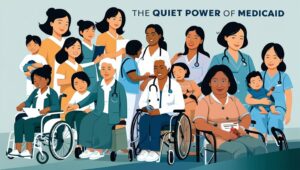
People with chronic illnesses often have a lot of questions about the future, both for themselves and for those around them. When you’re diagnosed with a chronic illness, it can feel like everything around you has been tipped upside down. You might be worried about how to support your loved ones or even how you can keep your life stable in the long term. After all, not everything will get better after you’re diagnosed. It can be challenging trying to understand what your future holds when you have a chronic illness, but many different things could happen over time — and they may not all be positive. It’s natural to feel concerned about these things, but there are ways to prepare yourself so that the bad news doesn’t overwhelm you too much.
What Treatments Are Available?
Chronic illnesses can require a lot of different treatments. Many may be necessary from the very beginning to help you get well. For example, an autoimmune disorder might require drugs to help prevent attacks. Other chronic illnesses might require treatments that help manage pain or improve your quality of life. If you have cancer, you might be offered various treatments to help you feel better. Many people with cancer are offered therapy to help with symptoms like pain, nausea, and anxiety. Some people with cancer may also be offered immune therapies to help the body fight cancer more effectively.
What Will Happen to Your Health Over Time?
As you’re living with a chronic illness, your health may change. You may be weaker and have more frequent health problems as you grow older. This can be frustrating, but it’s completely normal. You might also have a harder time getting certain illnesses, like infections. The best way to cope with the health changes that you experience is to stay active, eat well, and get regular checkups. You can also learn how to deal with your health problems in a more responsible way, like taking your medications correctly.
Will Your Life Get Easier?
Chronic illness can be hard on relationships and finances. This can make life seem even harder. It’s important to remember that you’re not alone. Many people are living with the same issues, and you can find support from them. Many people with chronic illnesses have created online communities to help them find support and connect with others. It can be helpful to find a group that matches your interests and lifestyle, so you can feel connected to others in a meaningful way. You can also talk with your doctor or a nurse about treatment options that might help make your life easier, like lower or meal delivery. If pain is a big problem for you, you might be able to get help from a rehabilitation facility or someone who is trained in managing pain.
What Happens to Your Finances After You’re Diagnosed?
Many people who have chronic conditions have relatively stable finances. However, if you have a terminal illness like cancer, you’ll likely have significant expenses. You might have to pay for treatments like chemotherapy, radiation therapy, and surgery. You might also need to pay for prescriptions that are related to your condition. You might also have to pay for supportive care, like physical or occupational therapy.
If you have a long-term condition, your monthly expenses might be higher over time. This could include things like higher medical bills, higher insurance premiums, and higher costs for medications. Even if your condition is relatively stable, you may still have to change your lifestyle to save money. For example, you might have to drive less or switch to a lower-cost medication. There are a few different ways to handle the financial strain, including getting medical bill relief. It is important to find the best option for you and try to keep your finances as stable as you can.
How to Stay Mentally Healthy
Living with a chronic illness can be tough. It’s important to remember to take care of yourself. This includes things like getting enough sleep, eating healthy meals, taking regular breaks, and getting some exercise. You can also try to build mental health into your day. This can mean scheduling time to unplug from your to-do list, like reading a book or spending time with a pet. You can also try to make time to relax, like listening to music or watching funny videos online.
How to Cope With a Chronic Illness Diagnosis
There are many different ways to cope with a diagnosis of a chronic illness. It can help to talk about it with your loved ones and to try to feel optimistic about the future. Another thing you should do is try to learn as much information about your condition as possible. This can help you make more informed decisions in the future.
Conclusion
Finding out that you have a chronic illness can be a very difficult process. It’s important to remember that there are many ways to cope with a chronic illness. It can also help to keep in mind that not every future will be easy, and you can find ways to make it as comfortable as possible. If you or someone you know has been diagnosed with a chronic illness, it can be helpful to remember that many different things could happen to your health in the future. This can help you be prepared for what may come.


